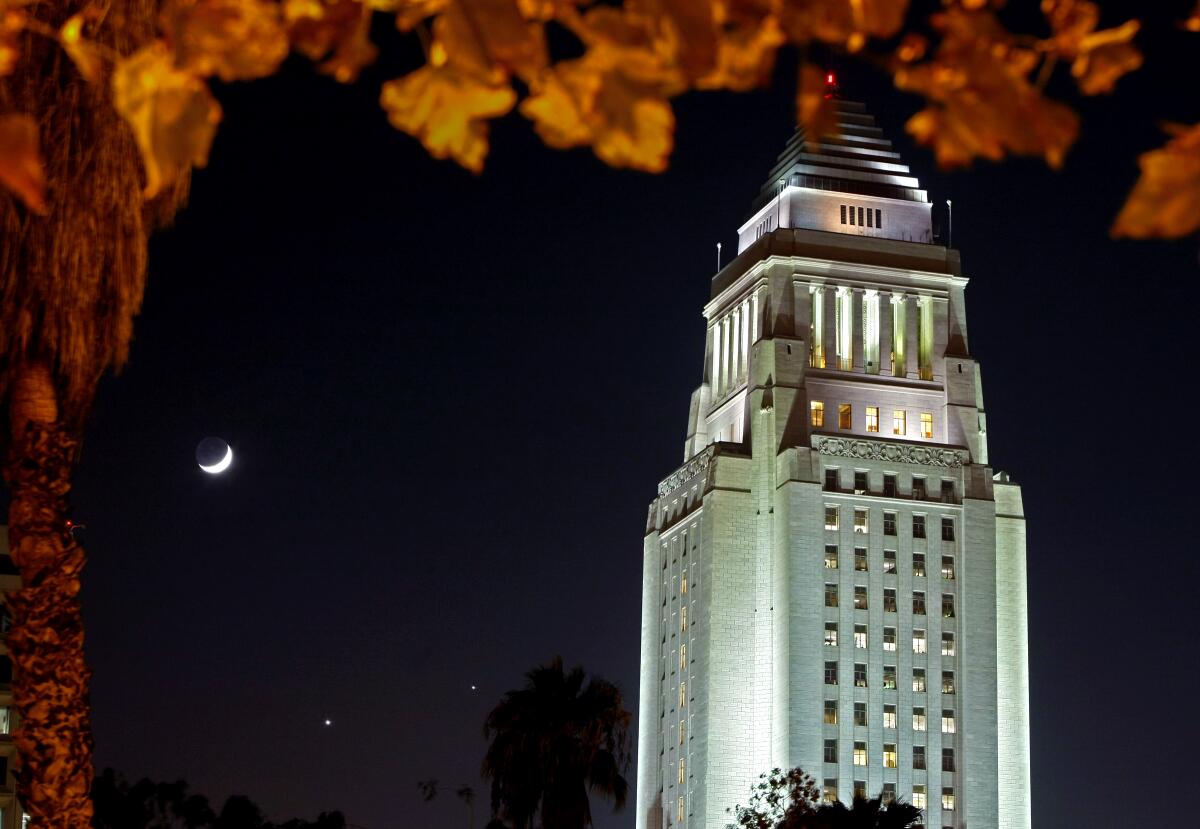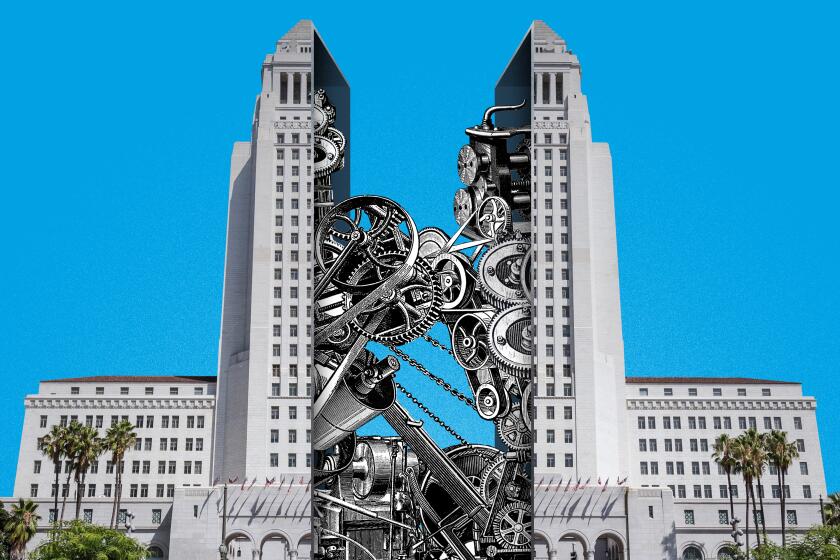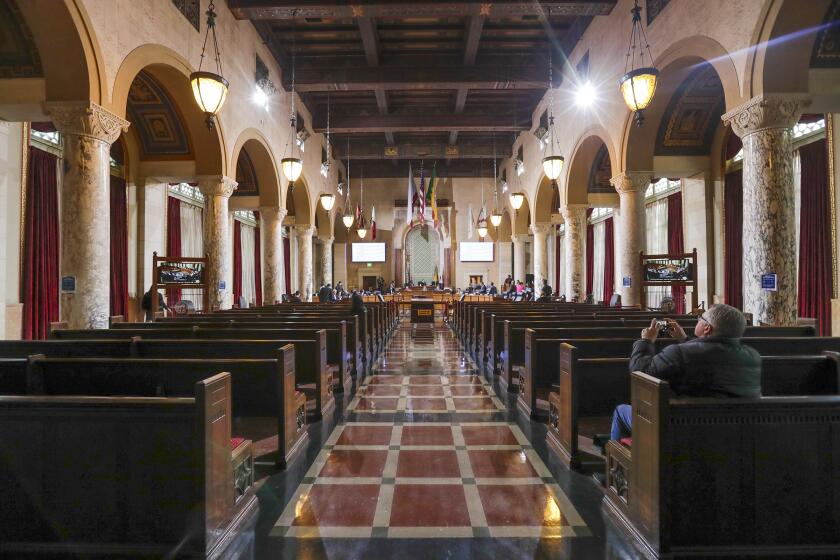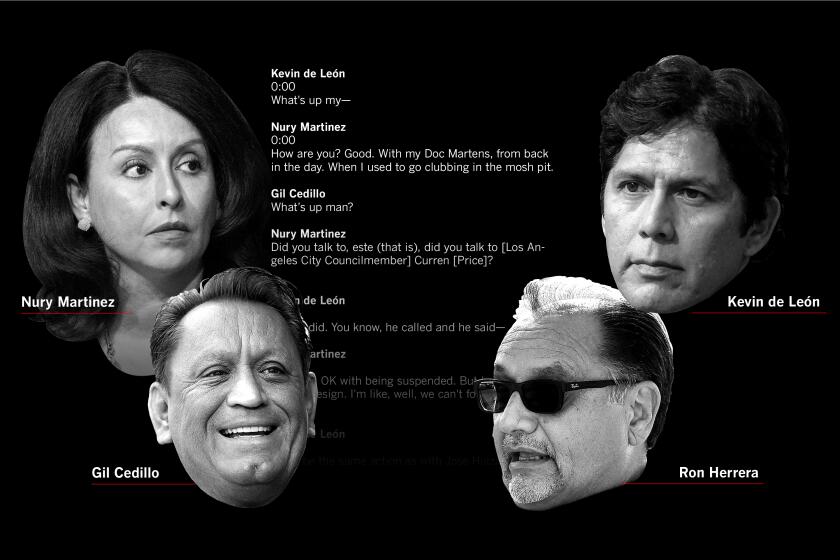Editorial: We have a rare opportunity to fix City Hall. This is how

- Share via
Los Angeles has been presented with a rare opportunity to redistribute political power and improve representation and governance. The leaked recording of three City Council members and a labor official breezily exchanging racist comments about their colleagues, while plotting to carve up the city into districts that protect their own interests, has united much of L.A. in outrage. And that outrage opens a door through which key reforms can be pushed.
Over the last month, The Times editorial board outlined in depth three key reforms that we think can vastly improve Los Angeles governance. Now we look at how to make those reforms happen.
The simplest first step is to change the redistricting process, so that never again can the city’s politicians draw their own lines and, in effect, choose their own voters. Redistricting reform — through the creation of an independent redistricting commission — has improved the process in California and most Western states, plus Michigan, and it is increasingly common in cities and counties. Adopting this approach in Los Angeles should be relatively simple and uncontroversial, with the council presenting voters a ballot measure to amend the City Charter.
The most likely target date would be Nov. 5, 2024, the next general election, when representation for several City Council seats will be decided. If the council fails to act, voters could put the measure on the ballot themselves with an initiative campaign, although gathering signatures is costly.
Los Angeles City Hall has been rocked by scandal after scandal, but now there’s momentum to reform city government.
There may be a second, quicker route. In 2016, the state Legislature overrode the objections of the Los Angeles County Board of Supervisors and scrapped the county’s redistricting process, replacing it with an independent redistricting commission. Can the Legislature do that with the city of L.A. as well? It’s possible, though there remain some questions, because cities are not subdivisions of the state in the same way counties are. Several lawmakers are studying the issue and may consider legislation to impose independent redistricting in Los Angeles. If they succeed, L.A. need not wait until 2024 for this particular reform.
What about other reforms? A larger City Council would improve representation by reducing the population of each district, and it would tamp down abuse of power by spreading it among a larger number of officials. Diminishing each council member’s authority over real estate development and other land-use matters would reduce the incentives for graft and could compel construction of housing and commercial properties in each district to more closely follow growth plans that have been vetted by residents.
A 2024 package of three charter amendments — independent redistricting, a larger council and land-use reform — would be a significant step in achieving long-needed changes in L.A. city governance. Motions on each are currently moving through the City Council process.
Yet the current civic and political moment may accommodate even more expansive thinking. Voters just elected a new mayor, city attorney and city controller, plus several new council members, all of them City Hall newcomers. Angelenos are talking and ideas are flowing: What about fully publicly financed elections, to enable Angelenos with skill and integrity, but little money, to run for office? Or “democracy dollars” — vouchers distributed to city residents that can then be donated to candidates to redeem for actual campaign money? How about participatory budgeting? Ethics reforms? Policing reforms? A community bank? These ideas, and others that may arise from a broader discussion, embracing more Angelenos in multiple forums, may well be worth exploring.
Los Angeles has the biggest council districts in the nation. Voters need to add seats to the 15-member council to increase representation and accountability.
But a more sweeping reinvention of Los Angeles might require a different route. State law allows voters to elect a charter reform commission, which would conduct hearings, draft an entirely new City Charter and put it on the ballot. Los Angeles last went through that in the late 1990s.
It was a cumbersome and politically fraught process. The City Council, feeling threatened by the prospect of a diminished role, created a rival commission. The two panels bickered, then tried to create a joint package of reforms. The final product left many participants unsatisfied. And it took nearly three years.
Taking a similar route now would mean asking voters to elect a charter commission in November 2024. That means no actual reforms on the ballot until 2026.
As an alternative, a coalition of civic groups is currently planning a comprehensive charter reform conversation independent of both City Hall and the formal charter reform process. The format and scope of this conversation is to be developed over the coming months, but it could result in a proposal for several reforms or a comprehensive package that the council, or a signature campaign, could put before voters.
A bombshell recording has thrown L.A. politics into chaos. What was really being discussed? L.A. Times reporters and columnists pick it apart, line by line.
Simple, one-at-a-time proposals can move quickly and may have a greater chance of success because they do not hitch broadly accepted ideas, like independent redistricting, to more controversial measures like, say, a larger council. But simple changes may underutilize L.A.’s rare reform moment.
The most direct and least costly route is through the City Council, but that means time is of the essence. Every council member and candidate who responded to a Times survey expressed support for independent redistricting and other reforms, but the longer they are in office and begin to exercise their powers, the less likely they are to relinquish it.
There’s no reason not to follow multiple paths at the same time — a ballot measure for independent redistricting, as a standalone or joined with measures for a larger council and a change to land-use authority — concurrent with a broader process to vet other, possibly more far-reaching reforms.
The issue is power and how it is distributed, and the time for change is now. Los Angeles has a new generation of leaders, as yet unbound to old ways, and eager to make its mark. Angelenos have the best shot in years of transforming the way their city is governed. Let’s take that shot.
More to Read
A cure for the common opinion
Get thought-provoking perspectives with our weekly newsletter.
You may occasionally receive promotional content from the Los Angeles Times.













